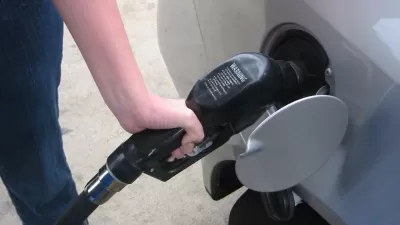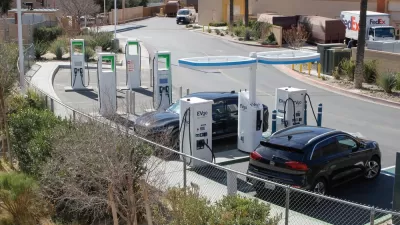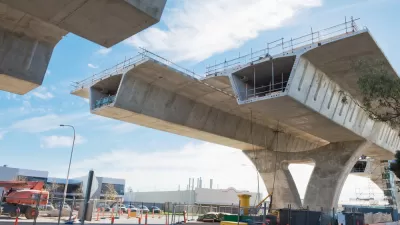The true cost of vehicle and road use is not reflected in the price drivers pay.

It is widely understood that there are enormous and growing negative externalities associated with motor vehicle use, in the form of pollution, sprawl, and public safety, to name a few. But all too often the American narrative on gas prices is that they are too high. External costs can be hard to measure and challenging to accurately convey to a user group. Perhaps more commonly understood is that the direct costs of vehicle use—namely, the maintenance and construction of roads—is covered by gasoline taxes. A new report from the Frontier Group—in partnership with the U.S. PIRG Education Fund—cracks this myth wide open. The price paid by car drivers does not come close to covering even the direct costs of road use.
"Puncturing the widely held myth that cars pay their own way makes this report required reading for those thinking about transportation finance reform," writes Joe Cortwright.
Federal subsidies to the highway administration system are enormous. "Since 1947, the amount of money spent on highways, roads and streets has exceeded the amount raised through gasoline taxes and other so-called 'user fees' by $600 billion (2005 dollars), representing a massive transfer of general government funds to highways," according to the report.
The price mechanism for road use is not based on a user fee because gas taxes, which are often referred to as user fees, are not necessarily directed to the actual roads the driver uses. In some cases, states subsidize federal highways, in other cases, the federal government has redirected gas tax revenues to pork-barrel infrastructure projects, and with the exception of tolled roads, drivers pay rates based on mileage, not the actual roads they use.
Cortwright argues that if gas prices and other vehicle use fees reflected the true cost of use, single-occupant vehicle use would decrease, as drivers would opt for cheaper forms of travel.
"These facts put the widely agreed proposition that increasing the gas tax is politically impossible in a new light: What it really signals is car users don’t value the road system highly enough to pay for the cost of operating and maintaining it. Road users will make use of roads, especially new ones, but only if their cost of construction is subsidized by others."
FULL STORY: Beyond gas: The price (of driving) is wrong

Planetizen Federal Action Tracker
A weekly monitor of how Trump’s orders and actions are impacting planners and planning in America.

Maui's Vacation Rental Debate Turns Ugly
Verbal attacks, misinformation campaigns and fistfights plague a high-stakes debate to convert thousands of vacation rentals into long-term housing.

San Francisco Suspends Traffic Calming Amidst Record Deaths
Citing “a challenging fiscal landscape,” the city will cease the program on the heels of 42 traffic deaths, including 24 pedestrians.

Defunct Pittsburgh Power Plant to Become Residential Tower
A decommissioned steam heat plant will be redeveloped into almost 100 affordable housing units.

Trump Prompts Restructuring of Transportation Research Board in “Unprecedented Overreach”
The TRB has eliminated more than half of its committees including those focused on climate, equity, and cities.

Amtrak Rolls Out New Orleans to Alabama “Mardi Gras” Train
The new service will operate morning and evening departures between Mobile and New Orleans.
Urban Design for Planners 1: Software Tools
This six-course series explores essential urban design concepts using open source software and equips planners with the tools they need to participate fully in the urban design process.
Planning for Universal Design
Learn the tools for implementing Universal Design in planning regulations.
Heyer Gruel & Associates PA
JM Goldson LLC
Custer County Colorado
City of Camden Redevelopment Agency
City of Astoria
Transportation Research & Education Center (TREC) at Portland State University
Jefferson Parish Government
Camden Redevelopment Agency
City of Claremont




























